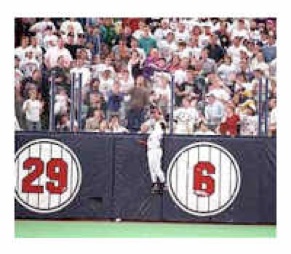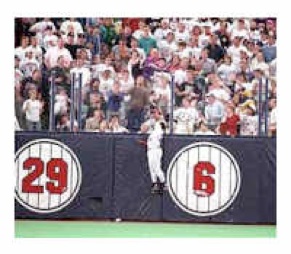

Baseball - The Mythic Sport of America
by Susan Nease
Baseball is the quintessential American game. Like England and cricket, no other sport in the American playing field so clearly defines the journey of the American people through the past 150 years. Further, baseball is well-known for its superstitions and legendary plays. Yet what is it about baseball specifically that turns it from a mere game, a sport to be enjoyed on the field or via box scores, into the realm and power of mythology?
On a mundane level, one does not have to be a sports enthusiast to recognize terms in current American parlance such as "This came from left field" or "It's a slow curve with a fast break." And thanks to the movies, we know that there was once a man named Shoeless Joe Jackson who was banned forever from the game of baseball, and that women once had a league of their own.
Historically, baseball's creation coincides with the creation of post-Civil War America. The formation of leagues and teams shows the major industrial centers of late 19th century America:
Boston, Detroit, Brooklyn, Cleveland, and Philadelphia. In addition, each town that could afford to create a baseball field had a team of guys sponsored by the local mill or who held day jobs at the local hardware store. A town knew its heroes - the players who would take that town's pride and fight for that town's honor against the neighboring towns. In a time in America's past when small towns still thrived, a time that itself has become mythologized, baseball gave a small town a sense of pride and identity that would have otherwise been exclusive to big cities.
Several cultural elements of myth that exist in baseball are The Hero, The Journey, the Enemy, and The Scapegoat. For the purposes of this essay, I will discuss the Enemy and the Journey first, before proceeding into a discussion of the Hero and the Scapegoat.
Baseball's Enemies are several. First are the owners, men who for so many years wielded great power over the players' lives and livelihoods. Owners seldom come up through the ranks of players to achieve a pinnacle of success by owning a team. (One ironic exception is Charles Comiskey, owner of the 1919 Chicago White Sox.) Retired baseball players regularly become managers or announcers, staying with the team and the game they love. Baseball owners first create their fortunes through industry, then add a baseball team as an investment to a portfolio. Further, baseball teams often pass down through owner's families' hands through trusts, keeping a tight rein on who may (or may not) own a baseball team.
An example of Owners-as-Enemy for the fans was the 1998 Florida Marlins. At the start of the 1998 season, the owners of the 1997 World Series champions, the Florida Marlins, disbanded the

Baseball - The Mythic Sport of America
by Susan Nease
Baseball is the quintessential American game. Like England and cricket, no other sport in the American playing field so clearly defines the journey of the American people through the past 150 years. Further, baseball is well-known for its superstitions and legendary plays. Yet what is it about baseball specifically that turns it from a mere game, a sport to be enjoyed on the field or via box scores, into the realm and power of mythology?
On a mundane level, one does not have to be a sports enthusiast to recognize terms in current American parlance such as "This came from left field" or "It's a slow curve with a fast break." And thanks to the movies, we know that there was once a man named Shoeless Joe Jackson who was banned forever from the game of baseball, and that women once had a league of their own.
Historically, baseball's creation coincides with the creation of post-Civil War America. The formation of leagues and teams shows the major industrial centers of late 19th century America: Boston, Detroit, Brooklyn, Cleveland, and
Philadelphia. In addition, each town that could afford to create a baseball field had a team of guys sponsored by the local mill or who held day jobs at the local hardware store. A town knew its heroes - the players who would take that town's pride and fight for that town's honor against the neighboring towns. In a time in America's past when small towns still thrived, a time that itself has become mythologized, baseball gave a small town a sense of pride and identity that would have otherwise been exclusive to big cities.
Several cultural elements of myth that exist in baseball are The Hero, The Journey, the Enemy, and The Scapegoat. For the purposes of this essay, I will discuss the Enemy and the Journey first, before proceeding into a discussion of the Hero and the Scapegoat.
Baseball's Enemies are several. First are the owners, men who for so many years wielded great power over the players' lives and livelihoods. Owners seldom come up through the ranks of players to achieve a pinnacle of success by owning a team. (One ironic exception is Charles Comiskey, owner of the 1919 Chicago White Sox.) Retired baseball players regularly become managers or announcers, staying with the team and the game they love. Baseball owners first create their fortunes through industry, then add a baseball team as an investment to a portfolio. Further, baseball teams often pass down through owners’ families' hands through trusts, keeping a tight rein on who may (or may not) own a baseball team.
An example of Owners-as-Enemy for the fans was the 1998 Florida Marlins. At the start of the 1998 season, the owners of the 1997 World Series champions, the Florida Marlins, disbanded the

















